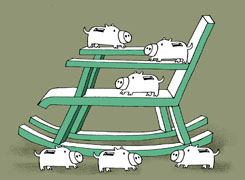Ramalingam Kalirajan |11047 Answers |Ask -Follow
Mutual Funds, Financial Planning Expert - Answered on Jun 06, 2024
He has an MBA in finance from the University of Madras and is a certified financial planner.
He is the director and chief financial planner at Holistic Investment, a Chennai-based firm that offers financial planning and wealth management advice.... more

Need retirement plan for me to going to retire in next 3 years
Assessing Current Financial Situation
First, review your current financial status. This includes your savings, investments, and any debts you may have. Understanding your financial health is the foundation of a good retirement plan.
Evaluate Savings: Calculate the total savings you have. This includes bank accounts, fixed deposits, and other liquid assets.
Review Investments: Look at your portfolio. Assess stocks, mutual funds, bonds, and other investments. Identify their current value and future potential.
Analyze Debts: List all outstanding debts. This includes loans, credit card balances, and any other liabilities. Plan to pay these off before retiring.
Defining Retirement Goals
It's important to have clear retirement goals. These goals will guide your planning and help you stay focused.
Lifestyle Expectations: Decide the kind of lifestyle you want post-retirement. Consider travel, hobbies, and other activities you plan to pursue.
Living Expenses: Estimate your monthly expenses post-retirement. Include essentials like housing, utilities, groceries, and healthcare.
Contingency Fund: Set aside funds for emergencies. This ensures you’re prepared for unexpected expenses without compromising your lifestyle.
Strategic Investment Planning
With your goals defined, it’s time to plan your investments. This involves reallocating assets, considering safer investment options, and ensuring a steady income stream.
Diversify Investments: Spread your investments across various asset classes. This reduces risk and enhances returns. Avoid putting all your money in one place.
Focus on Mutual Funds: Mutual funds are a good option. They offer diversification, professional management, and potential for higher returns. Actively managed funds can outperform passive index funds.
Regular Review: Regularly review and rebalance your portfolio. This helps in maintaining the right asset allocation and optimizing returns.
Understanding the Role of Insurance
Insurance plays a crucial role in securing your retirement. It protects against unforeseen events and ensures financial stability.
Health Insurance: Ensure you have adequate health insurance. Medical expenses can be significant post-retirement.
Life Insurance: If you have dependents, maintaining life insurance is important. It provides financial security to your family in your absence.
Review Existing Policies: If you hold LIC, ULIP, or investment-cum-insurance policies, evaluate their performance. Consider surrendering underperforming policies and reinvesting in mutual funds through a Certified Financial Planner (CFP).
Building a Retirement Corpus
Building a sufficient retirement corpus is essential. This ensures you have enough funds to cover your expenses throughout retirement.
Calculate Corpus: Determine the corpus needed based on your estimated expenses and life expectancy. Use retirement calculators for accuracy.
Systematic Investment Plans (SIPs): Invest regularly through SIPs in mutual funds. This helps in accumulating a substantial corpus over time.
Consider Debt Funds: As you near retirement, shift a portion of your investments to debt funds. They offer stability and lower risk.
Ensuring a Steady Income Stream
Post-retirement, having a steady income stream is vital. It helps in managing day-to-day expenses without dipping into your corpus.
Dividend-paying Stocks: Invest in dividend-paying stocks. They provide regular income and potential capital appreciation.
Monthly Income Plans (MIPs): MIPs in mutual funds are designed to provide regular income. They invest in a mix of debt and equity for balanced returns.
Senior Citizen Savings Scheme (SCSS): SCSS offers regular interest payments. It’s a safe option with attractive interest rates for retirees.
Systematic Withdrawal Plan (SWP): An SWP allows you to withdraw a fixed amount regularly from your mutual fund investments. This provides a steady income while keeping the remaining corpus invested for growth.
Tax Planning for Retirement
Effective tax planning can save a significant amount of money, enhancing your retirement corpus.
Tax-efficient Investments: Invest in tax-efficient instruments like ELSS (Equity Linked Savings Scheme). They offer tax benefits under Section 80C.
Senior Citizen Tax Benefits: Be aware of the tax benefits available for senior citizens. This includes higher exemption limits and deductions.
Plan Withdrawals: Strategize your withdrawals from retirement accounts to minimize tax liability. Consult a CFP for personalized advice.
Managing Inflation Risk
Inflation can erode your purchasing power over time. It’s important to plan for it to maintain your lifestyle.
Inflation-linked Investments: Consider investments that offer inflation protection, like certain government bonds.
Regularly Adjust Corpus: Reevaluate your retirement corpus periodically. Adjust for inflation to ensure it remains adequate.
Increase SIP Amounts: If possible, increase your SIP contributions annually. This helps in combating inflation and building a larger corpus.
Healthcare Planning
Healthcare costs can be a major concern during retirement. Proper planning ensures you’re prepared for any medical expenses.
Health Insurance Coverage: Ensure you have comprehensive health insurance. Opt for a plan that covers a wide range of medical expenses.
Critical Illness Cover: Consider adding critical illness cover to your policy. It provides a lump sum on diagnosis of serious illnesses.
Medical Emergency Fund: Keep a separate fund for medical emergencies. This ensures quick access to funds when needed.
Estate Planning
Estate planning is essential to ensure your assets are distributed according to your wishes.
Create a Will: Draft a will to specify how your assets should be distributed. This avoids legal complications and ensures peace of mind.
Nominate Beneficiaries: Ensure all your financial accounts have updated nominees. This simplifies the transfer of assets.
Consider a Trust: If you have significant assets, consider setting up a trust. It provides more control over asset distribution and tax benefits.
Emotional Preparedness
Preparing for retirement is not just about finances. It’s also about emotional readiness for this new phase of life.
Engage in Hobbies: Pursue hobbies and activities you enjoy. This keeps you mentally active and fulfilled.
Stay Socially Connected: Maintain strong social connections. Spend time with family and friends to stay engaged and happy.
Volunteer Work: Consider volunteering for causes you care about. It provides a sense of purpose and community involvement.
Seeking Professional Guidance
While this guide provides a comprehensive overview, consulting a Certified Financial Planner (CFP) can offer personalized advice tailored to your unique situation.
Customized Plans: A CFP can create a customized retirement plan based on your goals and financial status.
Regular Monitoring: They offer regular monitoring and adjustments to your plan, ensuring it remains on track.
Expert Advice: Benefit from expert advice on complex financial matters, tax planning, and investment strategies.
Regularly Reviewing Your Plan
It’s essential to regularly review your retirement plan. Life changes, market conditions fluctuate, and your needs may evolve.
Annual Reviews: Conduct an annual review of your plan. Adjust your investments, savings, and goals as needed.
Stay Informed: Keep yourself informed about financial markets and changes in economic conditions. This helps in making informed decisions.
Adaptability: Be flexible and adaptable. Your retirement plan should evolve with your changing circumstances.
Maintaining Financial Discipline
Maintaining financial discipline is key to achieving your retirement goals. Avoid unnecessary expenses and stick to your budget.
Budgeting: Create and adhere to a budget. Track your expenses and ensure you’re living within your means.
Avoid Impulse Spending: Avoid impulsive purchases. Prioritize needs over wants to ensure financial stability.
Debt Management: Stay out of debt. Pay off any outstanding loans and avoid taking new ones post-retirement.
Creating a Legacy
Think about the legacy you want to leave behind. This goes beyond financial assets and includes values and memories.
Family Values: Pass on your family values and traditions. Share your life experiences and lessons with younger generations.
Philanthropy: Consider charitable donations and philanthropy. Support causes you care about to make a positive impact.
Personal Memoirs: Write personal memoirs or letters for your loved ones. This creates lasting memories and a personal legacy.
Preparing for the Unexpected
Prepare for unexpected events that could impact your retirement plans. This ensures you’re ready for any eventuality.
Emergency Fund: Maintain a robust emergency fund. It covers unforeseen expenses and provides peace of mind.
Legal Documents: Keep all legal documents organized and accessible. This includes your will, insurance policies, and financial records.
Regular Communication: Communicate your plans and wishes with your family. Ensure they are aware of your plans and know where to find important documents.
Staying Healthy
Good health is crucial for an enjoyable retirement. Invest in your health through regular check-ups and a healthy lifestyle.
Regular Check-ups: Schedule regular health check-ups. Early detection of health issues ensures better management and treatment.
Healthy Lifestyle: Maintain a healthy lifestyle. Eat a balanced diet, exercise regularly, and avoid harmful habits like smoking.
Mental Well-being: Focus on mental well-being. Engage in activities that keep your mind sharp and reduce stress.
Enjoying Your Retirement
Finally, retirement is a time to enjoy life. Focus on what brings you joy and fulfilment.
Travel: If you love travelling, plan trips to places you’ve always wanted to visit. Explore new cultures and experiences.
Learning: Continue learning. Take up new hobbies, attend workshops, or even consider part-time work in areas of interest.
Family Time: Spend quality time with family. Create lasting memories with your loved ones.
In conclusion, a well-rounded retirement plan involves assessing your financial situation, defining goals, strategic investing, and maintaining financial discipline. Regularly review your plan, seek professional guidance, and focus on your health and well-being. With careful planning and a positive outlook, you can look forward to a fulfilling and financially secure retirement.
Best Regards,
K. Ramalingam, MBA, CFP,
Chief Financial Planner,
www.holisticinvestment.in
You may like to see similar questions and answers below
Hemant Bokil | Answer |Ask -Follow
Financial Planner - Answered on Mar 21, 2023
Ramalingam Kalirajan |11047 Answers |Ask -Follow
Mutual Funds, Financial Planning Expert - Answered on May 07, 2024
Ramalingam Kalirajan |11047 Answers |Ask -Follow
Mutual Funds, Financial Planning Expert - Answered on Jul 30, 2025
Radheshyam Zanwar |6825 Answers |Ask -Follow
MHT-CET, IIT-JEE, NEET-UG Expert - Answered on Mar 02, 2026
Ravi Mittal |706 Answers |Ask -Follow
Dating, Relationships Expert - Answered on Mar 02, 2026
Ravi Mittal |706 Answers |Ask -Follow
Dating, Relationships Expert - Answered on Mar 02, 2026
Patrick Dsouza |1453 Answers |Ask -Follow
CAT, XAT, CMAT, CET Expert - Answered on Mar 02, 2026
Nayagam P P |10928 Answers |Ask -Follow
Career Counsellor - Answered on Mar 02, 2026
Nayagam P P |10928 Answers |Ask -Follow
Career Counsellor - Answered on Mar 02, 2026
Dr Deepa Suvarna |177 Answers |Ask -Follow
Paediatrician - Answered on Mar 02, 2026
Ramalingam Kalirajan |11047 Answers |Ask -Follow
Mutual Funds, Financial Planning Expert - Answered on Mar 02, 2026
Ramalingam Kalirajan |11047 Answers |Ask -Follow
Mutual Funds, Financial Planning Expert - Answered on Mar 02, 2026
T S Khurana |558 Answers |Ask -Follow
Tax Expert - Answered on Feb 28, 2026




























